US Economy May Wake Up Without Consumers' Prodding?
Economics / US Economy May 22, 2007 - 01:09 AM GMTBy: Paul_L_Kasriel
In Mondays Wall Street Journal , reporter Christopher Conkey wrote a piece suggesting that with 75% of the economy faltering, the other 25% was going to accelerate, preventing the 100% from stalling out. Let's start with business investment. Historically, business fixed investment is a lagging indicator.
That is, after residential investment (housing) and consumer spending head for the deck, then business investment follows household spending down. This pattern of business fixed investment spending lagging household spending is shown in Chart 1. On a contemporaneous basis, the correlation between the two series is 0.47. The highest correlation between the series, 0.69, occurs when household spending is advanced (leads) by two quarters.
Chart 1
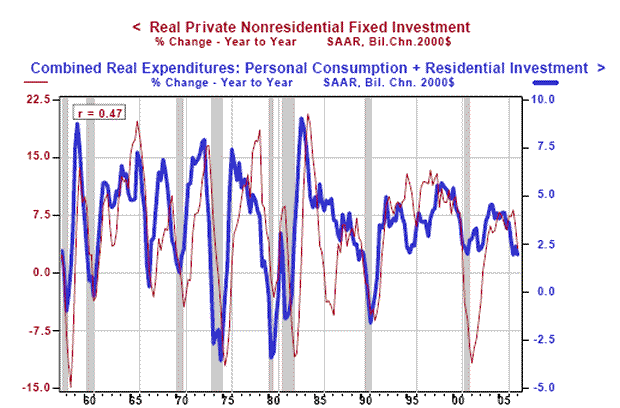
But wait, what about corporate profits? With corporations flush with cash, surely they will start to deploy more of it to capital spending rather than buying back their stock in record amounts, right? Logically this is incorrect. If cash-flush corporations have not already been on capital spending spree in the face of strong domestic demand, why would they now decide to do so when domestic demand is slowing? ISM surveys for both manufacturing firms as well as non-manufacturing firms confirm the logic - both sectors plan slower capital spending this year (see Chart 2). With operating rates (capacity utilization) well off their respective peaks (see Chart 3), it is not exactly as though firms need to add capacity now.
Chart 2
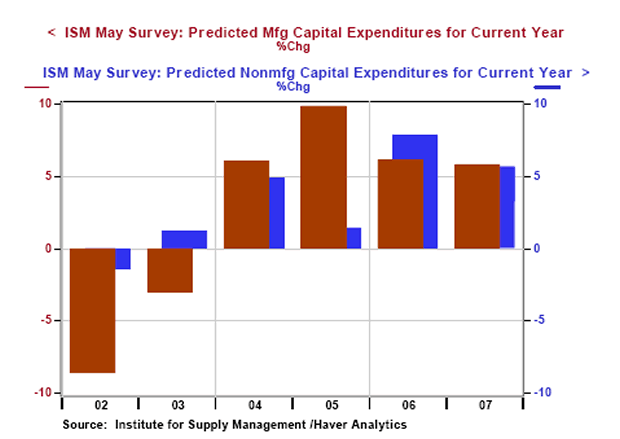
Chart 3
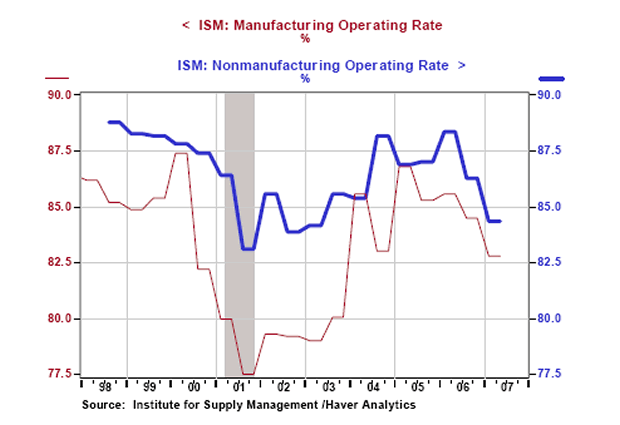
Lastly, when adjusted for serial correlation (trend), a regression explaining year-over-year business capital spending growth in terms of household spending and corporate profit growth, we find that coefficient on profit growth is negative. That is, faster corporate profit growth leads to slower capital spending (see table below). But not to worry. The t-value associated with the corporate profit growth variable is so low that the coefficient is deemed to statistically not different from zero.
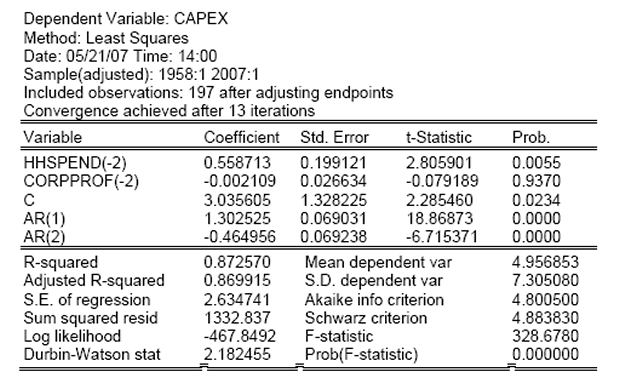
So, the prospects for a major revival in business capital spending are not looking too good. What about inventories? In relation to sales, inventories have started to fall. But the largest contributor to declining inventory-to-sales ratios is in the retailing "space" (see Chart 4). With consumer spending starting to flag in the face of slower job growth and declining home values, will retailers be in a hurry to restock their shelves?
Chart 4
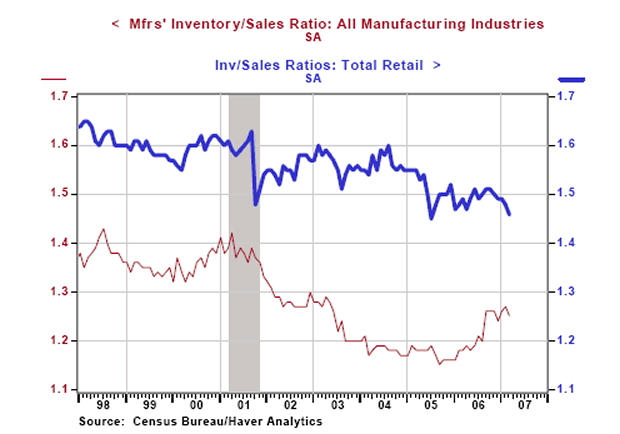
With supplier deliveries getting faster not slower (indicated by a falling index value in Chart 5), with no materials in short supply and with industrial metals prices showing signs of peaking out (Chart 6), will manufacturers be motivated to quickly rebuild their inventories?
Chart 5
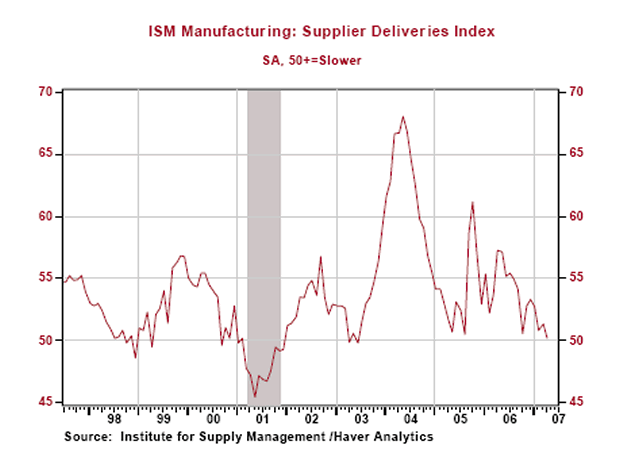
Chart 6
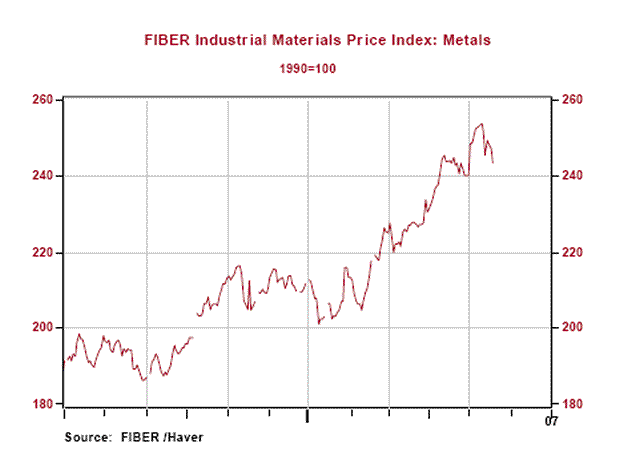
I do agree that export growth is likely to pick up near term what with the rest of the world growing strongly and the dollar trending lower. But remember, a good part of the rest of the world's growth is derived from exports. With U.S. domestic demand slowing, this will have a negative effect on the rest of the world's exports (see U. S. Economic and Interest Outlook, May 14, 2007, "The Rest Of The World Is Going To Rejuvenate The U.S. Economy?".) In addition, foreign central banks are tightening their monetary policies, which will slow down their domestic demand growth with a lag. Lastly exports accounted for less than 11-1/2% of real GDP last year - already a record post-war high. If the other 88% of GDP (consumer spending and private domestic investment) is slowing, it is going to take one heck of an acceleration in exports to keep the U.S. economy from stalling out.
By Paul L. Kasriel
The Northern Trust Company
Economic Research Department - Daily Global Commentary
Copyright © 2007 Paul Kasriel
Paul joined the economic research unit of The Northern Trust Company in 1986 as Vice President and Economist, being named Senior Vice President and Director of Economic Research in 2000. His economic and interest rate forecasts are used both internally and by clients. The accuracy of the Economic Research Department's forecasts has consistently been highly-ranked in the Blue Chip survey of about 50 forecasters over the years. To that point, Paul received the prestigious 2006 Lawrence R. Klein Award for having the most accurate economic forecast among the Blue Chip survey participants for the years 2002 through 2005.
The opinions expressed herein are those of the author and do not necessarily represent the views of The Northern Trust Company. The Northern Trust Company does not warrant the accuracy or completeness of information contained herein, such information is subject to change and is not intended to influence your investment decisions.
© 2005-2022 http://www.MarketOracle.co.uk - The Market Oracle is a FREE Daily Financial Markets Analysis & Forecasting online publication.



